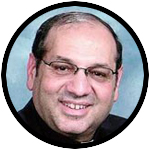
Father Gus Puleo
Be glad and rejoice — for you have been chosen to share in the Passion of Christ who became the most disabled man when he hung on the cross for love of us. – Mother Teresa
***
Every Sunday morning I look forward to seeing three of my favorite parishioners, all with Down syndrome, at St. Patrick Church in Norristown.
Brandon is a 4-year old Mexican child, Matthew is 16 and Stephen is in his 50s.
The little one always waves at me when I walk up the aisle as Mass begins, and Matthew is my altar server who devotedly comes and serves every Sunday. Stephen comes faithfully to Mass every Sunday with his mother.
These three persons are a powerful force in our church that unites us all as they are known and loved by everyone. All stop, shake hands and speak to the three individuals every Sunday.
[hotblock]
According to recent studies, at the turn of the 20th century a baby diagnosed with Down syndrome was not expected to live past his 10th birthday. However, in 2018 life expectancy for an individual with Down syndrome has been extended until about 60 years of age due to greater biomedical knowledge, advances in public health care and even technological developments.
Under current law a woman can abort a baby prior to 24 weeks before birth for any reason, except if the woman’s only reason is to select the sex of the child. A new legislation called the Turzai-Ward bill introduced in the Pennsylvania House of Representatives in early February 2018 includes the exception to prohibit aborting a child due to a prenatal diagnosis that the child has Down syndrome. In many nations, persons with Down syndrome have been almost completely eliminated due to abortions of pre-born children with this diagnosis.
Each of us has a God-given dignity. The incarnation of the Son of God means that Jesus had to become “like his brothers and sisters in every respect” (Hebrews 2:17) even to death on the cross. So this image of Christ is completely inclusive and not exclusive of the complete human experience and therefore embraces those with disabilities.
Jesus’ body after the resurrection also bore the marks and scars of being impaired left by the spear in his side and the nails in his hands and feet (Luke 24:39-40: “Look at my hands and feet, and see that it is I myself. Feel me, and you will know”).
Also, the life, death and resurrection of Jesus Christ in the Eucharist calls attention to the brokenness of his body. Christ’s broken body unites our church, the body of Christ, and also heals the brokenness of each individual because of the inclusion of each person around the Eucharist. No one is perfect, but we all have something to contribute to society, and especially to the church.
Many babies diagnosed before birth with Down syndrome are aborted in the United States. Mothers are counseled to abort these beautiful children both directly and indirectly by the medical profession, genetic counselors and even our culture.
So we applaud those families, who against the medical advice given by professionals, have chosen to keep their babies and not abort them. They especially know firsthand the love and grace that these individuals bring to a family. In addition, we also stand up for those representatives who are in favor of life — the lives of all children, but especially those with Down syndrome.
However, medical and social advances have changed what it means to live with Down syndrome as there are more opportunities for these persons in all aspects of life including schools, communities and even professional life. A wonderful example is Karen Gaffney, a long-distance swimmer with Down syndrome who received a Doctorate of Humane Letters from the University of Portland on May 5, 2013. She is the only living person with Down syndrome who has been awarded an honorary doctorate.
This woman participated in a relay team that crossed the English Channel, completed the Alcatraz triathlon and even swam the width of Lake Tahoe. Karen uses her swimming for overcoming struggles and doubts in the many talks that she gives throughout the nation and world. It is both for her swimming and public advocacy for those with Down syndrome that the University of Portland recognized her with this impressive award.
Karen Gaffney’s life and the lives of my three wonderful parishioners are a testament that any medical or cultural bias against individuals with Down syndrome is wrong and unjust. We must protect our children with Down syndrome at every stage of life, but especially when they are the most vulnerable. Stand up for life!
***
Father Puleo is pastor of St. Patrick Parish in Norristown and adjunct professor of Spanish at St. Charles Borromeo Seminary.
PREVIOUS: Of Lent and the day of love
NEXT: Why the Vatican’s potential deal with China is a good thing



Share this story